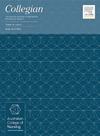Strategies to improve communication with older adults experiencing delirium in emergency departments: A systematic review
IF 1.7
4区 医学
Q2 NURSING
引用次数: 0
Abstract
Background
Effective communication with older adults experiencing delirium in emergency departments (EDs) is crucial for optimal patient care. This systematic review aimed to identify barriers and enablers to communication with this population and synthesise evidence on effective strategies that support both communication and delirium management.
Methods
A comprehensive search of PubMed, MEDLINE, CINAHL, Web of Science, Cochrane Library, and Google Scholar was conducted for studies published between 2000 and 2024. Eligible studies focused on communication with older adults experiencing delirium in EDs. Data extraction and quality assessment were performed independently by two reviewers.
Results
Fourteen studies met the inclusion criteria. Key barriers to effective communication included cognitive impairments, environmental factors, time constraints, and lack of staff training. Enablers included the use of standardised screening tools, multicomponent interventions, and specialised staff education. Environmental modifications and the involvement of family members were also found to enhance communication. The review highlighted the importance of early delirium detection and the effectiveness of structured communication protocols in supporting overall delirium management.
Conclusion
Effective communication with older adults experiencing delirium in EDs requires a multifaceted approach. Implementing routine screening, providing targeted staff training, and adopting person-centred care principles can significantly improve outcomes. Future research should focus on developing and validating ED-specific communication strategies that also support comprehensive delirium care, incorporating patient and family perspectives.
Implications
Findings emphasise the need for healthcare providers to prioritise delirium education, implement standardised screening protocols, and create delirium-friendly ED environments.
提高与急诊科经历谵妄的老年人沟通的策略:一项系统综述
背景:与在急诊科(EDs)经历谵妄的老年人进行有效的沟通对于优化患者护理至关重要。本系统综述旨在确定与这一人群沟通的障碍和促进因素,并综合支持沟通和谵妄管理的有效策略的证据。方法综合检索PubMed、MEDLINE、CINAHL、Web of Science、Cochrane Library、谷歌Scholar等网站2000 - 2024年间发表的研究。符合条件的研究集中于与急诊科中经历谵妄的老年人的交流。数据提取和质量评估由两名审稿人独立完成。结果14项研究符合纳入标准。有效沟通的主要障碍包括认知障碍、环境因素、时间限制和缺乏员工培训。促成因素包括使用标准化筛查工具、多成分干预措施和专门的工作人员教育。环境的改变和家庭成员的参与也有助于加强沟通。该综述强调了早期谵妄检测的重要性以及结构化通信协议在支持谵妄整体管理中的有效性。结论与急诊科出现谵妄的老年人进行有效沟通需要多方面的方法。实施常规筛查、提供有针对性的工作人员培训和采用以人为本的护理原则可以显著改善结果。未来的研究应侧重于开发和验证ed特定的沟通策略,这些策略也支持全面的谵妄护理,并结合患者和家庭的观点。研究结果强调,医疗保健提供者需要优先考虑谵妄教育,实施标准化的筛查方案,并创造谵妄友好的ED环境。
本文章由计算机程序翻译,如有差异,请以英文原文为准。
求助全文
约1分钟内获得全文
求助全文
来源期刊

Collegian
NURSING-
CiteScore
2.70
自引率
6.70%
发文量
127
审稿时长
72 days
期刊介绍:
Collegian: The Australian Journal of Nursing Practice, Scholarship and Research is the official journal of Australian College of Nursing (ACN).
The journal aims to reflect the broad interests of nurses and the nursing profession, and to challenge nurses on emerging areas of interest. It publishes research articles and scholarly discussion of nursing practice, policy and professional issues.
Papers published in the journal are peer reviewed by a double blind process using reviewers who meet high standards of academic and clinical expertise. Invited papers that contribute to nursing knowledge and debate are published at the discretion of the Editor.
The journal, online only from 2016, is available to members of ACN and also by separate subscription.
ACN believes that each and every nurse in Australia should have the opportunity to grow their career through quality education, and further our profession through representation. ACN is the voice of influence, providing the nursing expertise and experience required when government and key stakeholders are deciding the future of health.
 求助内容:
求助内容: 应助结果提醒方式:
应助结果提醒方式:


